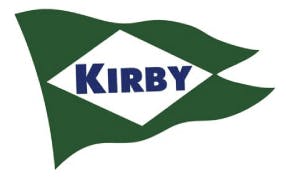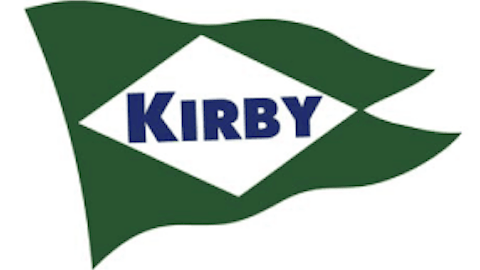It was back in 2005 that I began seriously following Kirby Corporation (NYSE:KEX), a Houston-based company that plies its trade in two distinct areas: the operation of tank barges and tugboats on inland waterways and along the U.S. coast, and servicing the big diesel engines that power marine, power generation, energy, and railroad operations.
In the intervening years, the company has continued to expand pragmatically and profitably. It’s part of a cadre of companies that are not technically in the energy sector, but rise and fall on the fortunes of oil and gas. They therefore present ideal — albeit often overlooked — ways to invest in energy, without exclusively casting your lot with conventional producers, oil-field services providers, or pipeline companies.

At last count, Kirby Corporation (NYSE:KEX)’s fleet consisted of nearly 850 inland tank barges, 250 inland towboats, 80 coastal tank barges, 85 coastal tugboats, and 8 offshore dry cargo barge-and-tugboat combinations. In the increasingly important area of coastal tank barges, the company operates about 30% of total U.S. capacity.
With the vast majority of domestic production of chemicals and petrochemicals occurring in Texas and Louisiana, Kirby’s inland routes often originate in those states and terminate in a variety of locations in the North and East. It’s cargos typically consist of petrochemicals, black oil, refined products, and agricultural chemicals. It’s biggest customers include the likes of The Dow Chemical Company (NYSE:DOW) and the chemicals unit of Exxon Mobil Corporation (NYSE:XOM).
Kirby Corporation (NYSE:KEX)’s diesel operations, which have steadily expanded to account for about 25% of total revenues, are also affected by energy trends in the U.S. After all, diesel provides the power for many of the exploration and production operations in the Gulf of Mexico and for pressure pumping onshore.
A change of direction
You likely know that a previously gaping price gap between Brent crude and West Texas Intermediate has closed significantly since about May. One result has been a shrinkage in the disparity between inland and coastal oil prices in the U.S. The latter has set off a vast reduction in the number of oil barges carrying crude down the Mississippi and ultimately to refineries on the Gulf Coast.
Instead, barge fleets have been redeployed to haul oil along the Gulf Intracoastal Waterway that runs between Texas and Florida. Rather than transporting Bakken crude south, then, the barges are frequently taking Eagle Ford oil eastward to refineries in southeast Texas and Louisiana.
Significantly, the total cost of moving crude by barge from Corpus Christi to New Orleans is about $4 per barrel, and half that if it’s unloaded at refineries near Freeport. That compares to the approximately $18 it costs to haul Bakken crude to the Gulf Coast.
Flexible Kirby Corporation (NYSE:KEX) has adapted well to this logistical change, as its second quarters rose nearly 25% year over year. A key lesson here is that, given flexibility not shared by either pipelines or rail, barges are able to adapt to altered circumstances in the rapidly expanding production of crude oil in the U.S.




